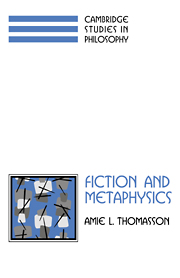Book contents
- Frontmatter
- Contents
- Acknowledgments
- Introduction: From Fiction Into Metaphysics
- Part One The Artifactual Theory of Fiction
- Foreword
- 1 If we postulated fictional objects, what would they be?
- 2 The nature and varieties of existential dependence
- 3 Fictional characters as abstract artifacts
- 4 Reference to fictional characters
- 5 Identity conditions for fictional characters
- Part Two Ontological decisions
- Notes
- Bibliography
- Index
4 - Reference to fictional characters
Published online by Cambridge University Press: 23 September 2009
- Frontmatter
- Contents
- Acknowledgments
- Introduction: From Fiction Into Metaphysics
- Part One The Artifactual Theory of Fiction
- Foreword
- 1 If we postulated fictional objects, what would they be?
- 2 The nature and varieties of existential dependence
- 3 Fictional characters as abstract artifacts
- 4 Reference to fictional characters
- 5 Identity conditions for fictional characters
- Part Two Ontological decisions
- Notes
- Bibliography
- Index
Summary
Dominant theories of the reference of names have emphasized that names, unlike descriptions, function by means of a direct reference to their objects, and that causal and historical circumstances play an essential role in our ability to refer to objects by name. This model seems to break down in the case of fictional names: If fictional objects are not spatiotemporally located, then it seems they must also be causally inert, making it inconceivable how causal or historical circumstance could play any role in the reference of fictional names.
This supposed incompatibility between the claim that fictional names refer and the claim that causal or historical features are essential to the reference of names has provoked many to reject the thesis that fictional names refer. Traditional causal theories of reference treat names of fictional characters as nonreferring terms, and in Naming and Necessity Kripke goes still further to argue that genuinely fictional names cannot refer to any actual or possible object. Indeed, anyone who wants an even partially naturalistic account of the reference of names, taking causal or historical chains to play an essential role in the reference of names, has cause to worry about the case of fictional names. Those who take fictional discourse seriously have on occasion taken the other horn of the dilemma, maintaining that because causal or historical theories cannot allow that fictional names refer we should abandon an across-the-board causal-historical model of reference.
Troubles with reference present difficulties for those postulating fictional objects, for if we cannot successfully refer to fictional characters at all, then there seems little point in postulating them, and the process of acquiring knowledge about them becomes mysterious.
Information
- Type
- Chapter
- Information
- Fiction and Metaphysics , pp. 43 - 54Publisher: Cambridge University PressPrint publication year: 1998
